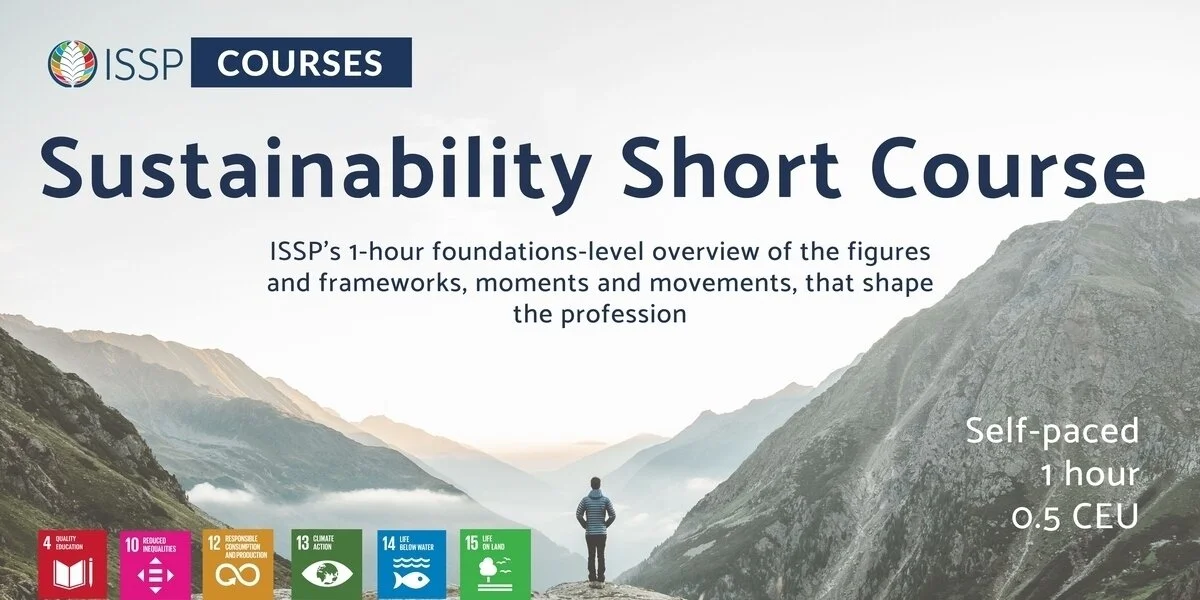What You Will Learn
Hear the evolving definition of “sustainability” and its implications across key historical moments and sectors
Introduce a few lenses for understanding sustainability concepts, with a focus on planetary boundaries
Introduce the United Nations Sustainable Development Goals (SDGs)
Learn economic theories pertaining to: donut economics, the circular economy, and Triple Bottom Line
Introduce corporate governance and social responsibility
Introduce a few leading sustainability standards and protocols
Meet several economists and figures from the sustainability movement
Explore systems-thinking to bring about change to solve the world’s toughest challenges
Note from the ISSP team: The ISSP Sustainability Short Course is intended as a fundamental learning experience that anyone can benefit from, regardless of job description. To gain a more intermediate understanding of the same learning outcomes presented in the Short Course, we recommend ISSP’s Sustainability Foundations 4-hour course, which dives deeper into these themes, including on natural capital, ecological footprint, Natural Step, Gaia Theory, the UN system, leading sustainability leaders and much more.
Who is This Course For?
► Professionals wishing to gain foundational knowledge on sustainability but for whom sustainability may not be a direct work function in their job description
► Business, corporations, higher education institutions providing broad-based sustainability knowledge to their entire workforce in a quickly digestible format
► Beginning sustainability professionals working in any sector
► Students in all disciplines who may not have sustainability courses as part of their degree program
► Anyone interested in contributing to a world that can sustain healthy, livable societies
Course Description
At their core, sustainability concepts are about understanding and fostering systems — economic, social, and environmental — that can operate in perpetuity. Here is your invitation to join ISSP, the leading global network of sustainability professionals, as we present an overview of our foundations-level course to ready prospective sustainability practitioners of all backgrounds to be agents of positive change in their communities, companies, and the green workforce.
Across five self-paced modules—presented through an engaging animated slide deck and easy-to-follow narration—you’ll visit several key moments, concepts, and figures throughout sustainability’s history. Join us touring the first Earth Day and the groundbreaking environmental policies it inspired to the adoption of the United Nations’ 2030 Agenda and the Sustainable Development Goals, along with the evolution of economic theory to incorporate resources from a finite planet. Gain basic-level knowledge on key environmental, social and governance mechanisms organizations are using to embed sustainability in their corporate operations, government policies, and throughout society.
If you, your employees or students seek an overview spanning the founding of the United Nations System decades ago to cradle-to-cradle circularity and ESG principles driving progress today, the ISSP Short Course is for you.
Certificate
Following the successful completion of the course, students will receive a Certificate of Completion, indicating they understand the basics of sustainability concepts, frameworks used by practitioners, and the leading initiatives advancing sustainability around the world.
Your Syllabus
The course is presented in five modules, totally 1 hour:
1) What is sustainability?
2) The limits to growth and systems thinking
3) Areas of environmental impact
4) Areas of social and economic impact
5) Levers for change
Course participants will take one quiz at the end of each module, approximately 30 questions each. Following the successful completion of the course, students will understand the basics of sustainability concepts, frameworks used by practitioners, and the leading initiatives advancing sustainability around the world.
Meet Your Course Creator
Holly Robbins is one of the founding faculty for the Minneapolis College of Art and Design (MCAD) Master of Arts in Sustainable Design program, a purpose-built, discipline-agnostic online program intended to create the next generation of skilled creatives who will envision and design a more sustainable future. As adjunct faculty, she teaches courses on the practice of sustainable design and also authors courses for the program and ISSP. She is also a partner and co-owner in This Is Folly, an award-winning creative firm in Minneapolis, Minnesota, USA and a former Target Corporation creative director.
About the International Society of Sustainability Professionals
The ISSP is the world’s leading professional association of sustainability practitioners. A member-driven nonprofit organization, ISSP moves the sustainability profession forward by defining professional excellence and empowering individuals, educational institutions and companies to advance sustainability within their organizations, regardless of sector. ISSP launched the Sustainability Excellence Associate (SEA) and Sustainability Excellence Professional (SEP) credentials (formerly the ISSP Sustainability Associate and ISSP Certified Sustainability Professional credentials) in 2016 to define and recognize competency in the field of sustainability. Since, ISSP has partnered with GBCI, which formally acquired the credentials in 2019, to enhance, scale and promote the credentials in order to drive positive environmental, social and economic outcomes in organizations and communities worldwide.
Copyright and Sharing
This course was developed by the International Society of Sustainability Professionals (ISSP). The material is intended for the individual who purchased the material and no part of it may be shared or reproduced without the written permission of ISSP.




